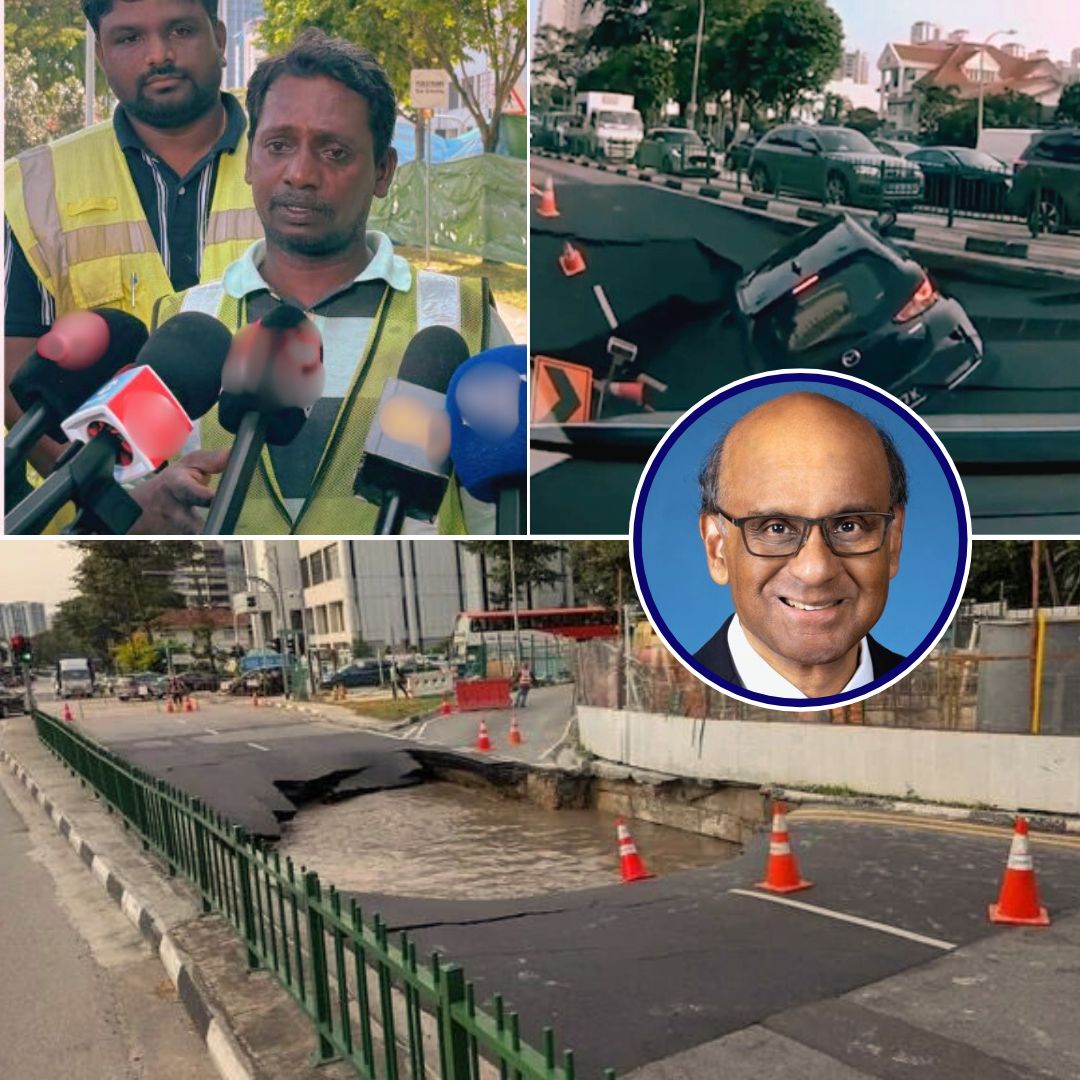On August 3, seven Indian migrant workers who heroically rescued a woman trapped in a 10-foot sinkhole on Tanjong Katong Road in Singapore will be personally invited to the Istana Palace Open House by President Tharman Shanmugaratnam. Led by site foreman Pitchai Udaiyappan Subbiah, the workers used a rope to pull the woman to safety within minutes.
The Ministry of Manpower’s Assurance, Care and Engagement (ACE) Group honoured them with appreciation coins, and over SGD 72,000 was raised for them by a migrant workers’ charity, ItsRainingRaincoats. Despite this recognition, these workers continue to face low pay, precarious conditions, and lack permanent residency rights. Officials have praised their bravery but stopped short of promising policy reforms.
Heroism in the Face of Danger: The Sinkhole Rescue
On July 26, a sudden collapse on Tanjong Katong Road South created a 10-foot sinkhole that engulfed a woman’s car, trapping her inside. Foreman Pitchai Udaiyappan Subbiah and his team—Velmurugan, Poomalai, Ganesan, Ajithkumar, Narayanasamy, and Sathapillai—reacted swiftly and courageously. Using only a rope, they pulled the woman out safely before the hole filled with water. Their quick thinking prevented what could have become a tragedy.
President Tharman Shanmugaratnam commended their “quick and courageous” actions, publicly acknowledging the workers on social media. The Ministry of Manpower’s Assurance, Care and Engagement (ACE) Group presented the men with tokens of appreciation. Donations from more than 1,600 contributors, channelled through the charity ItsRainingRaincoats, raised SGD 72,000+ to support the workers and their families. Investigations traced the sinkhole to structural failure at a nearby Public Utilities Board worksite.
More Than a Moment of Glory: The Realities of Migrant Workers
While their heroism received widespread praise, the workers’ everyday conditions remain stark. Many migrant labourers in Singapore earn as little as S$300 a month and live in crowded dormitories far from the city’s residential zones. They often face hazardous work and transport conditions—including transportation in unsafe flatbed trucks, implicated in multiple fatalities—and lack pathways to permanent residency.
This rescue and subsequent recognition have reignited public discourse on the systemic vulnerabilities facing migrant workers. Advocates and critics argue that symbolic awards and monetary donations, however well-intentioned, fall short of addressing fundamental rights such as fair wages, occupational safety, secure housing, and legal status. The Ministry of Manpower has acknowledged the importance of recognising migrant workers’ daily contributions but has yet to commit to concrete reforms addressing these issues.
Government Recognition and Support for Migrant Workers
The Assurance, Care and Engagement (ACE) Group is a division established within the Ministry of Manpower in 2020 to holistically support migrant workers’ well-being. Created in response to COVID-19 outbreaks in migrant dormitories, ACE has evolved into a permanent body focusing on improving healthcare access, living conditions, employment rights, and social integration for migrant workers in Singapore.
Their rescue has reignited debate on whether symbolic gestures like awards and financial help can truly compensate for systemic issues such as low wages, poor living conditions, and limited labour protections.
The Logical Indian’s Perspective
The extraordinary courage displayed by these seven migrant workers exemplifies values of empathy, selflessness, and community solidarity—key pillars for peaceful coexistence in any society. Yet, The Logical Indian emphasises that recognising individual acts of heroism must not overshadow the ongoing systemic inequities that these workers face daily.
Mere accolades and financial aid cannot substitute for comprehensive reforms ensuring migrant workers receive fair wages, safe working environments, dignified living conditions, and legal pathways to permanent residency. True empathy requires transforming gratitude into actionable social justice that addresses structural challenges, fostering a society where every worker’s rights are respected.
Singapore President @Tharman_S will host the seven Indian workers who rescued the driver from the sinkhole in Tanjong Katong at the Istana this Sunday. Our sincere thanks to the heros for acting quickly and decisively in the time of need 🙏🏽 🇮🇳🇸🇬 – HC Wong#singapore #rescue pic.twitter.com/dfAli8qzU5
— Singapore in India (@SGinIndia) July 31, 2025












